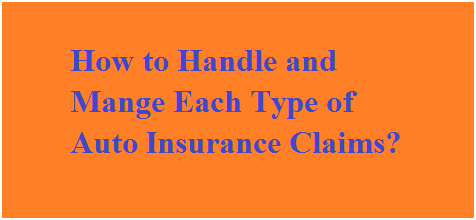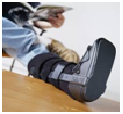Tips for Manage Different Types of Auto Insurance Claims
Filing an auto insurance claim: An accident is always scary. When it comes to an auto accident, it involves various risk factors such as damages done to the vehicle, personal injuries, and damage done to the property. You also have to go through hassle that includes dealing with bureaucracy and people involved in the accidents. It also causes financial difficulties. Here we will discuss on how to filing insurance claim after accident and car or any other vehicle accident insurance claim process. If you have a reliable insurance with good and comprehensive coverage, it can ease your stress and take care of expenses involved. You have to file documents, make claims and to see that the claim process gets smoother.

Following given are the details and guidelines about how to handle and mange each type of claims.
Bodily Injury Claims

If you get injured in an auto accident, you take appropriate steps to file a claim right away. For the accident, if you are at the fault, your liability pays for the other driver’s injuries, whereas if you are not at the fault, liability coverage will be provided by the at-fault party’s insurance company. If the accident takes place in no-fault state, you require personal injury protection (PIP).
You have to file a claim to your company,
- If you were at fault.
- If you are in a no-fault state that requires PIP as part of your liability insurance coverage.
- If you were the passenger, then you have to check with both your insurance company and the at-fault party’s insurance company regarding their policies. You can also inquire with state’s insurance department.
What documents do you need for a bodily injury claim?
You will have to provide details such as
- Name and contact details of every person involved in an accident
- Auto insurance details
- Accident details that include time and date of the accident, locations, pictures of the accident, expenses incurred for initial hospital and medical treatment as well as for ambulance and emergency room visit.
- You have to mention whether a police report was filed or not. It helps insurance company to decide on liabilities.
You might have to visit a medical practitioner chosen by the insurance company. It is a good practice to hire a personal injury attorney to help you guide through the claims process.
Property Damage Claims

If you meet an auto accident and your vehicle gets damaged, you have to file a claim to get it repaired by your auto insurer. You walk through the following guidelines that will help you claim process easier.
Whenever an accident occurs, there are some quick actions you should take:
- Move to a safe location
- Get the other driver’s name and insurance details
- Take pictures of vehicles involved in an accident.
- Collect contact information of the eye witnesses if there is any.
With whose insurance company do you have to file a claim?
To whom you should submit the claim depends on who was at the fault. If the other driver is at fault, then you should submit a third party claim to his insurer. If it is not clear, then you submit a claim to your insurer.
1. File a property damage claim with your auto insurance company
If you have comprehensive or collision insurance and you are not sure about the liability for the accident, then you must file your claim with your auto insurance provider.
If damages to your vehicle exceed a specific percentage of the vehicle value, your auto insurance company may deem the vehicle a total loss. In that case you might have to negotiate with the insurance company in order to determine the actual cash value of your vehicle. If your vehicle is deemed a total loss and if you have a lease or loan on it, gap insurance coverage can be huge money saver. It covers the difference between the amount you owe and the actual cash value of your vehicle.
2. File a property damage claim with the other party’s auto insurance company
If you are not at fault and if the property damage liability is clear, then filing with the other party’s insurer is the best choice. Most probably you will be provided a rental car to drive while your vehicle is being fixed. Even you will not have to pay deductibles before the necessary repairs are made.
If property damage claim is not associated with bodily injury claim, then you don’t need to hire an attorney as property damage claims are doesn’t require any legal representation.
Windshield Claims

Broken, cracked, or chipped windshields should not be ignored as a minor windshield problem left unresolved can lead to more serious windshield damages later on. It is better to get it fixed at the earliest.
If you have comprehensive coverage or specific glass coverage, you can file a windshield claim to cover the repair costs provided you’ve paid your deductible. When you file for windshield claim, you should consider that it will not increase your premiums.
You follow normal claim procedure in order to file a windshield claim, but make sure you file a claim before you take your vehicle for repairing and have paid deductible amount for the repairs.
Information required for filing windshield coverage
- Your vehicle identification number.
- Insurance policy number.
- Make, model and purchase year of your vehicle.
- Details regarding damage to your vehicle.
- Personal details
Managing Your Claims
When you have to make a claim, you identify the claim type and collect all the information required, this will speed up the claims process. Well managed insurance will ensure you making a file and processing of claim easier.
If you have to insure your vehicle, choose the right auto insurance provider in first place. A little research done can be very helpful in a long run. If you happen to make a claim for your auto, provide accurate information and documents required and it will avoid lot of hassle. File the claim at the earliest; you might have to answer some questions regarding accident and your action following it in case of personal injury.
